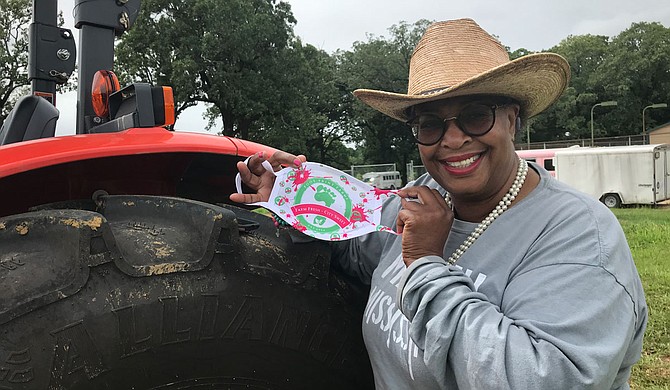Foot Print Farms founder Cindy Ayers-Elliott maximizes partnerships and farm practices to feed the community in safe and healthful ways. Photo courtesy Sherry Lucas
Canning and paperwork make for many a late night for Cindy Ayers-Elliott, Foot Print Farms' founder. But the daily business of growing and getting fresh vegetables to folks who need it continues, COVID-19 or not, and she rises to the challenge.
Pushed by the pandemic to start online orders, the west Jackson specialty crops farm found an avenue that works. "We came up with Drive-Up/Pick-Up," Ayers-Elliott says. People can pre-order produce through the farm's website and pick up their goods at the farm on Fridays.
"You come in, give your name, make the circle, head back out, and we drop it in their trunks," she says. The method puts her home's circular driveway to good use while maintaining social-distancing procedures and other safety practices.
Foot Print Farms has also kept its presence at the Mississippi Farmers Market.
"Social distancing, we still try to do that," Ayers-Elliott says, with their reconfigured stand making it so that customers do not touch the food. With a row of tables and food displayed behind workers, shoppers ask for items, and Foot Print Farms packs it for them.
The farm has helped fill family food needs through the Jackson Community COVID Response and JPS Community Partnership, and now delivers food to schools in Leland and Hollandale through the Farm to School program.
"We're growing the food, but we donated at least 30% of our costs to the project, so ... the more money they raised, the more food we could give out."
The pandemic paused the farm's agritourism component, a venture "really rolling" beforehand with its first Airbnb, Annie Mae's Cottage, and celebrity farm visits and exposure from the likes of TV chef/cookbook author Carla Hall and comedian Kevin Hart.
Other plans slowed, but proceeded. Foot Print Farms' statewide pilot program with insulin-maker Novo Nordisk is now a best-practices model, working with health clinics to use healthy food as medicine in diabetes and hypertension prevention.
"They're documenting, too, how this is scalable. ... It can be done in any part of the country now, any part of the world," Ayers-Elliott says. That funding will be plowed back into the farm, for a new building to expand cooling space and packing.
Next, the farm will focus on turning food waste to food use. The pandemic exposed many to food shortages for the first time. Ayers-Elliott envisions steps that involve processing and commercial kitchens that take the unsellable "not-so-pretty stuff, and actually do something with it," she says. Target outlets include "corner stores, mom-and-pops, (and) these stores they call food swamps where they have no veggies."
She continues, "This is the next economic, healthy, job-creating opportunity for the community. ... There's no reason why we, especially here in Mississippi, can't have self-sufficiency for some of the foods we eat. Right here."
To learn more about Foot Print Farms or place an order, visit footprintfarmsms.com.



Comments
Use the comment form below to begin a discussion about this content.
comments powered by Disqus